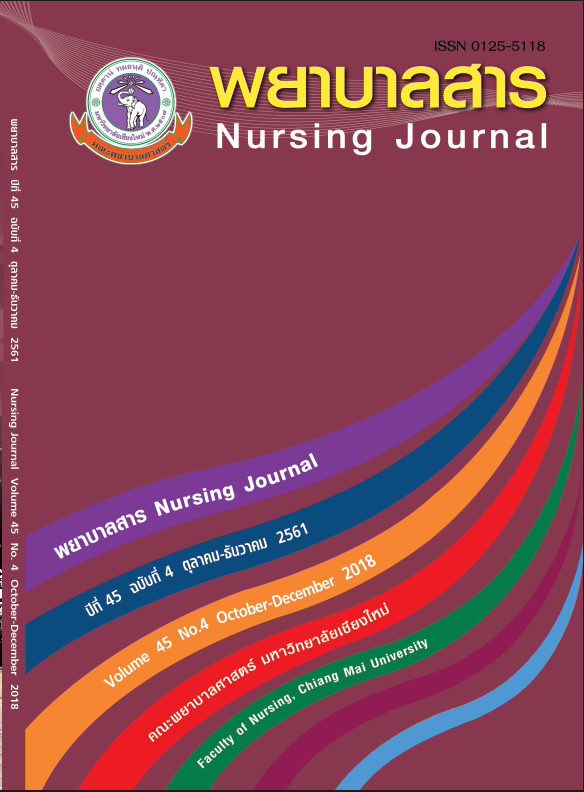บทบาทพยาบาลในการลดภาระจากการดูแลผู้ที่เป็นโรคสมองเสื่อม
คำสำคัญ:
โรคสมองเสื่อม, การลดภาระการดูแล, บทบาทของพยาบาลบทคัดย่อ
โรคสมองเสื่อม เป็นโรคที่เป็นการเจ็บป่วยชนิดเรื้อรัง มีการเสื่อมของการทำหน้าที่ต่างๆ รวมทั้งมีความรุนแรงหลายระดับ อีกทั้งยังเป็นหนึ่งสาเหตุหลักที่ทำให้เกิดความไร้ความสามารถในระยะสุดท้ายของชีวิต ผู้ป่วยจะสูญเสียความจำ การตัดสินใจและดูแลตนเองไม่ได้ ทำให้ผู้ดูแลต้องดูแลผู้ป่วยตลอดเวลา จึงพบว่าเป็นภาระค่อนข้างหนักในการดูแล ผู้ดูแลจะมีประสบการณ์ความรู้สึกเป็นภาระอยู่ในระดับสูง เนื่องจากต้องใช้เวลายาวนานในการดูแลและใช้พลังงานอย่างต่อเนื่องซึ่งทำให้ผู้ดูแลไม่มีเวลาในการดูแลสุขภาพของตนเองทำให้เกิดการเจ็บป่วนอกจากนี้ภาระของผู้ดูแลผู้สูงอายุที่เป็นโรคสมองเสื่อมยังส่งผลกระทบต่อวิถีการดำเนินชีวิตและจิตใจคือการสูญเสียรายได้ในครอบครัว เนื่องจากผู้ดูแลผู้สูงอายุที่เป็นโรคสมองเสื่อมไม่สามารถทำงานได้ตามปกติ สูญเสียเวลาส่วนตัว เกิดความขัดแย้งในครอบครัวอันเนื่องมาจากความรู้สึกไม่ยุติธรรมรู้สึกว่าบุคคลอื่นในครอบครัวละเลยทอดทิ้งให้รับภาระหนักเพียงผู้เดียว ดังนั้นพยาบาลซึ่งเป็นบุคลากรทางการแพทย์ จึงควรมีความเข้าใจและมีความรู้เกี่ยวกับ ภาระในการดูแลผู้ป่วยโรคสมองเสื่อม ซึ่งจะทำให้สามารถดูแลช่วยเหลือผู้ดูแลให้มีความรู้สึกเป็นภาระที่น้อยลงได้
เอกสารอ้างอิง
2016;12(4).
American Psychiatric Association. (2005). Diagnostic and Statistical Manual of Mental Disorder
(4th ed., text revision). Washington, DC: American Association.
Bunnak, O. (2000). Case study dementia. In Phunthumjinda, K. Editor. Dementia: disease or age .
3 rd edition. Bangkok: Kobfai publishing project. (In Thai)
Boonrayong, W. (1998). Occupational therapy for caring for the elderly dementia. Chiang
Mai: Occupational Therapy Department, Faculty of Associated Medical Sciences, Chiang
Mai University. (In Thai)
Churaitatsanee, S. (2018). Caring of caregiver: Physical and mental health. Academic articles,
Continuing Education, Department of Nursing. Number 17. Nursing care for dementia
patients. Siriyot Printing. (In Thai)
Eker E, Ertan T. (2000). Behavioral and psychological symptoms of dementia in
eastern and southeastern Europe and the middle east. International
Psychogeriatrics,12:409-13.
Foundation of Thai Gerontology Research and Development institute (TGRI). (2010). Situation of the
Thai elderly 2010. Bangkok. TQP company limited. (In Thai)
Ferri, C. P. et al. (2005). Global prevalence of dementia: a Delphi consensus study.
Lancet, 366, 2112–2117.
Institute Of Geriatric Medicine. (2000). A survey of dementia in Thai elderly. Ministry of Public
Health. Nonthaburi. (In Thai)
Krairit, O and Chansirikanjana, S. (2009). Thai health report 2009. Search from
http://www.hiso.or.th/hiso
Laytrakul, M and Sukanniy, P. (2015). Psychiatry. Ramathibodi. 4 th edition. Bangkok:
Department of Psychiatry , Faculty of Medicine, Ramathibodi Hospital , Mahidol University. (In Thai)
Mekawichai, P and Saetang, S. (2013). Caregiver Burden among Thai Dementia
Patients’ Caregivers . J Psychiatr Assoc Thailand. 58(1): 101-110. (In Thai)
Rakkhamnuan, S and Lueboonthavatchai, P. (2012). Behavioral and Psychological Symptoms of
Dementia (BPSD) and Caregiver Burden among Caregivers of Alzheimer’s Dementia
Patients at Department of Psychiatry, King Chulalongkorn Memorial Hospital. J
Psychiatr Assoc Thailand. 57(3): 335-346. (In Thai)
Pai, S., & Kapur, R.L. (1981). The burden on the family of a psychiatric patient:
Development of an interview schedule. British Journal of Psychiatry, 138,
332-335.
Pearlin L.I., Mullan J.T., Semple & Akaff M.M. (1990). Caregiving and the stress
process: an overview of concepts and their measures. The Gerontologist,
30(5), 583-594.
Thanaphan Sittaroen. (2000). Alzheimer care and caregiver problem. Bangkok: Kobfai publishing
project. (In Thai)
Siritpakron, P. (2017). Nursing manual providing care and preparation for relatives and caregivers
elderly with dementia. Nursing Department, Siriraj Hospital Mahidol University. (In Thai)
Sorensen S., Pinquart M., & Duberstein P. (2002). How effective are interventions
with caregivers? An updated meta-analysis. Gerontologist, 42, 356-72.
Sommannawan, W. (1991). A survey of family burden to caring for the demented elderly at home.
Master of Science thesis. Department of Psychiatry. Graduate School. Chulalongkorn
University. (In Thai)
Varcarolis, E.M. Halter, M.J, (2015). Foundations of Psychiatric Mental Health Nursing: A Clinical
Approach. (7th Edition). St. Louis, Missouri: Elsevier
Wimo A., Winblad B., & Jonnson L. (2010). The Worldwide societal costs of
dementia: Estimates for 2009. Alzheimer and Dementia, 6, 98-103.
World Health Organization. (2011). Dementia: a public health priority. United
Kingdom. Retrieved from http://www.who.int/about/
licensing/copyright_form/en/ index.html
Zarit, S.H. (2008). Diagnosis and management of caregiver burden in dementia.
Handbook of Clinical Neurology, 89, 101–106.
ดาวน์โหลด
เผยแพร่แล้ว
รูปแบบการอ้างอิง
ฉบับ
ประเภทบทความ
สัญญาอนุญาต
บทความที่ได้รับการตีพิมพ์เป็นลิขสิทธิ์ของวารสารพยาบาลสาร
ข้อความที่ปรากฏในบทความแต่ละเรื่องในวารสารวิชาการเล่มนี้เป็นความคิดเห็นส่วนตัวของผู้เขียนแต่ละท่านไม่เกี่ยวข้องกับมหาวิทยาลัยเชียงใหม่ และคณาจารย์ท่านอื่นๆในมหาวิทยาลัยฯ แต่อย่างใด ความรับผิดชอบองค์ประกอบทั้งหมดของบทความแต่ละเรื่องเป็นของผู้เขียนแต่ละท่าน หากมีความผิดพลาดใด ๆ ผู้เขียนแต่ละท่านจะรับผิดชอบบทความของตนเองแต่ผู้เดียว






